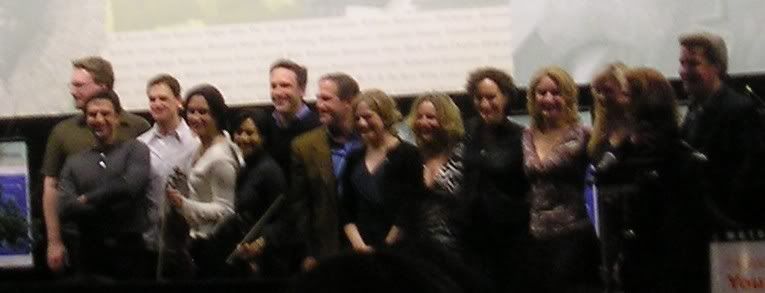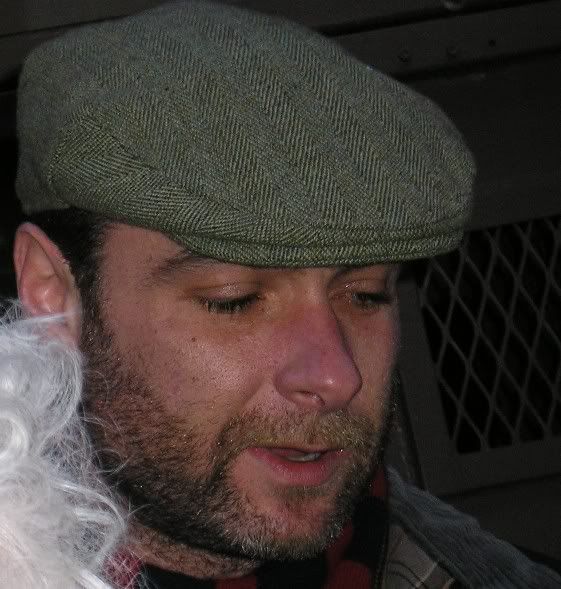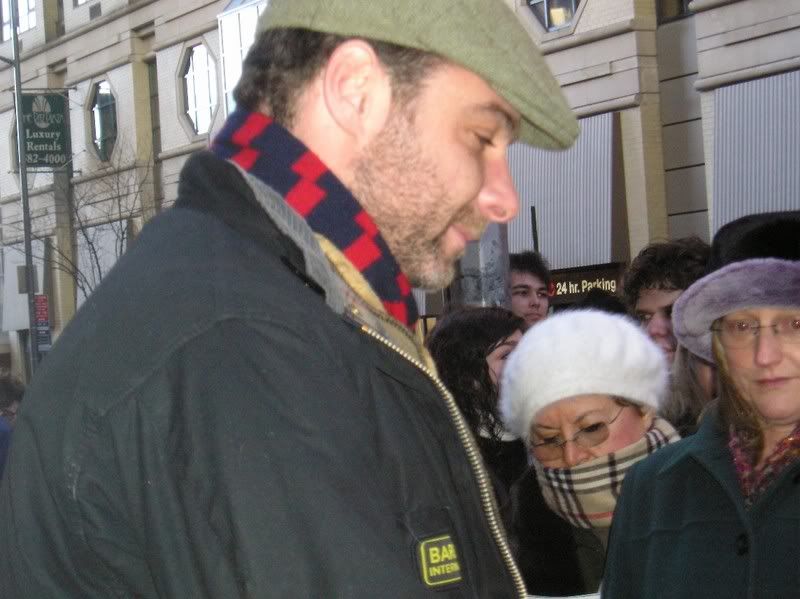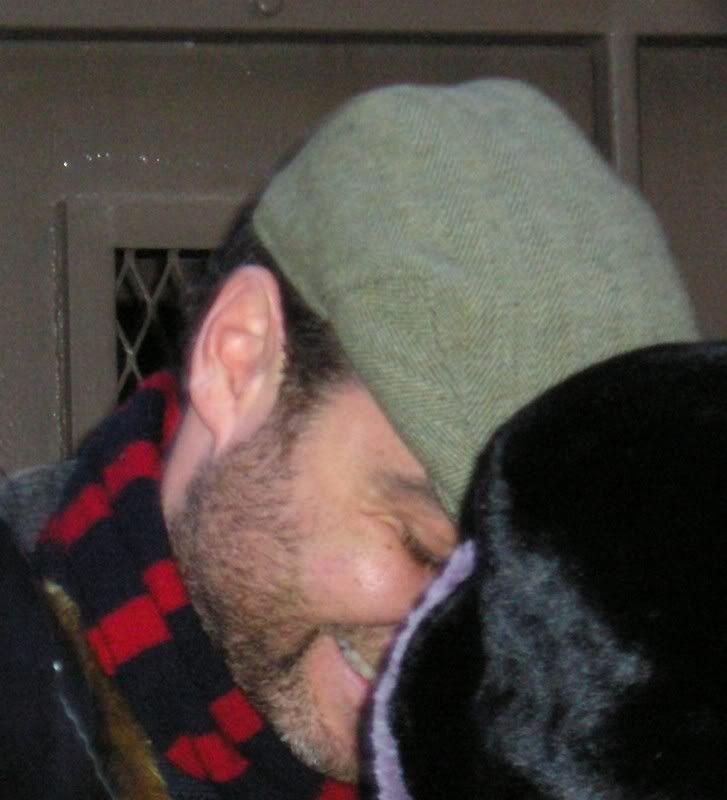Reviews: The Vertical Hour, Company, and Talk Radio
The Vertical Hour by David Hare
Feb 22, 2007, 8:00 p.m.
Orch H 22 $25.25
A former war correspondent turned professor (Julianne Moore) faces off on life, politics, and sex with her boyfriend's father (Bill Nighy). Brilliant play by David Hare, making this the second topical play he's done in 2 years, the previous the acclaimed Stuff Happens, set in the White House. Most of the reviews of this piece have centered around Julianne's "disappointing" performance (between her and Julia Roberts, it seems it is not a good year for film actresses on Broadway) and Bill Nighy's "brilliant, best of the year" performance, it feels like hardly anyone has paid any credit to the writer. About five minutes in I realized I didn't care who the actors were or what they did. I was hanging on every word. Wonderful. Highly recommended, but if the acting will bother you, then get the play and read it instead.
Incidentally, Julianne was fine, I thought, and Nighy was pretty good, but I was distracted that he adjusted his pants every time he moved. Will someone please tighten the man's belt?
Company by Stephen Sondheim (Music and Lyrics) and George Furth (Book)
Feb 20, 2007 7:00 p.m.
Mezz C 16, $29.25
It's odd to see this show by yourself. I suppose I could call it two hours of being like Bobby-alone and surrounded by people who have someone. (Let's not comment on how that's like life anyway…LOL)
I love the guy who plays Joanne's third husband. He has a thoughtful, quiet delivery that serves as the glue for all of the other crazy characters.
Raul almost fell when he was stepping from the piano to the radiator in 'Side by Side'. He hovered for a split second, wobbled, but then righted himself. It is a huge step that he takes at least twice in the show.
'Getting Married Today' was much better as Heather Laws has finally realized she can use the audience as her wedding guests and appeal to them. This gave the song life that it previously sorely lacked, no longer making the audience feel like eavesdroppers.
Bobby's swagger-in the beginning he struts around like he's in the Rat Pack, but as he starts to realize that the life he leads may not be the life he wants, and he's not sure what he wants (I think one of the most telling lines is his response when someone asks why he wants to get married and he shrugs and says, "For company."), the swagger dwindles and dwindles until the moment before Being Alive when it completely disappears and he walks to the piano.
Being Alive was amazing. Crying. Lots of crying. By him. I wonder what goes through his mind in the second before the screaming starts and the moment after the audience has quieted, before the cast starts up again, and he is alone on the stage.
The cast at Barnes & Noble the next day:

Talk Radio by Eric Bogosian
Feb 24, 2007 2:00 p.m.
Mezz A14, $38.25, with Kerissa
One night in 1987, a liberal shock jock (Liev Shrieber) is cutting down callers, but it is his own life that is falling apart. (Note, it just took me 10 times to type that name without MS changing it to 'Live', hence I will refer to him as LS for the rest of the review)
Most of the show is LS on the air with his callers. It is interrupted three times by monologues from his female fuckbuddy/assistant who loves him and can't get his attention, (one of the few people to see him with his defenses down-i.e. when he sleeps), his producer, an ex-dj hippie who left the frontlines of radio to work for him and is now happily married and worries that LS is only alive during the two hours he is on the air, and his station manager, who compares his star to a train about to derail; his concern is for the business, not the man. Protect the genius, protect the enterprise. Each monologue offers insight into the man who spends his life insulting others. They are delivered while LS is offstage, but he came in near the end of each one and puttered around, which I thought created a better coherency for the moments.
What makes this night different for all other nights? (Yes, for those observant, there are plenty of underlying Passover references throughout.) For one thing, it might be his last night on the small scale. Corporate sponsors are listening in, thinking of syndication. From the station manager's p.o.v., LS is doing everything he can to avoid that happening, starting with declaring, on air, that he will not compromise his behavior for anyone. Then, amongst the usual calls of quacks and teenagers, he's got someone doing a bad Jack Nicholson impression going neo-Nazi on him and sending an unmarked package that might contain a bomb down to the station. LS's calm reaction to it might be interpreted that he has a death wish, but I saw it as a man who knows his audience, can predict what a caller will do in seconds, and just doesn't give a fuck anymore.
A teenaged boy who may or may not be lying about his girlfriend overdosing has the execs concerned, but LS assures them he's faking. He gets these calls all the time. They order him to track the kid down anyway because the sponsors are worried. When the boy appears at the station, everyone is already on edge from the package, from the calls, the stress of the day, of the lives they lead. LS has been protecting himself from himself too long, and this day he cracks completely open. When the boy reaches into his pocket, everyone thinks he is going to pull out a gun. But this is a star-struck kid and he's got a camera. The flash sends LS to the floor as the boy is hustled out. LS stays down and curls into a fetal position, huddled against a toppled chair. The secondary producer signals for more commercials. (The rest of the crew has stormed out, chased away by LS.) Finally, LS gets up, wipes tears, and tells his audience he hates them all. They are all leeches who need him, and he hates them for that. The phones light up. People calling in to say they love him. To support him. He hangs up on each one before a sentence is out. Then, a final call from someone who called earlier in the day, someone who said they understood each other. "I live nearby," he says. "Come over. We can talk. Or not. I've got sandwiches. And beer, if you want." LS breaks down on the air. The caller says he'll be waiting and hangs up. 45 seconds left in the show and they've got dead air. LS composes himself. Will he speak? He does, simply signing off. Then he gets up and leaves and the next dj takes the seat.
The question this play leaves you with is 'what happens next?' I can imagine LS going out to his car, sitting in the parking lot for a long time, thinking about that last caller, maybe putting the car into gear and starting over there, but on the way, I think he'll turn around and go to his apartment. He'll open up another bottle of whisky, and he'll spend the night sitting alone. I don't want that to happen, but I think that's what he'll do.
LS is wonderful. The whole cast is. Highly recommended for writing that is humorous and tense and pertinent 20 years later. Seeing this and Vertical Hour, which is set Right Now, you can hardly tell that time has changed at all. Frightening.



Feb 22, 2007, 8:00 p.m.
Orch H 22 $25.25
A former war correspondent turned professor (Julianne Moore) faces off on life, politics, and sex with her boyfriend's father (Bill Nighy). Brilliant play by David Hare, making this the second topical play he's done in 2 years, the previous the acclaimed Stuff Happens, set in the White House. Most of the reviews of this piece have centered around Julianne's "disappointing" performance (between her and Julia Roberts, it seems it is not a good year for film actresses on Broadway) and Bill Nighy's "brilliant, best of the year" performance, it feels like hardly anyone has paid any credit to the writer. About five minutes in I realized I didn't care who the actors were or what they did. I was hanging on every word. Wonderful. Highly recommended, but if the acting will bother you, then get the play and read it instead.
Incidentally, Julianne was fine, I thought, and Nighy was pretty good, but I was distracted that he adjusted his pants every time he moved. Will someone please tighten the man's belt?
Company by Stephen Sondheim (Music and Lyrics) and George Furth (Book)
Feb 20, 2007 7:00 p.m.
Mezz C 16, $29.25
It's odd to see this show by yourself. I suppose I could call it two hours of being like Bobby-alone and surrounded by people who have someone. (Let's not comment on how that's like life anyway…LOL)
I love the guy who plays Joanne's third husband. He has a thoughtful, quiet delivery that serves as the glue for all of the other crazy characters.
Raul almost fell when he was stepping from the piano to the radiator in 'Side by Side'. He hovered for a split second, wobbled, but then righted himself. It is a huge step that he takes at least twice in the show.
'Getting Married Today' was much better as Heather Laws has finally realized she can use the audience as her wedding guests and appeal to them. This gave the song life that it previously sorely lacked, no longer making the audience feel like eavesdroppers.
Bobby's swagger-in the beginning he struts around like he's in the Rat Pack, but as he starts to realize that the life he leads may not be the life he wants, and he's not sure what he wants (I think one of the most telling lines is his response when someone asks why he wants to get married and he shrugs and says, "For company."), the swagger dwindles and dwindles until the moment before Being Alive when it completely disappears and he walks to the piano.
Being Alive was amazing. Crying. Lots of crying. By him. I wonder what goes through his mind in the second before the screaming starts and the moment after the audience has quieted, before the cast starts up again, and he is alone on the stage.
The cast at Barnes & Noble the next day:

Talk Radio by Eric Bogosian
Feb 24, 2007 2:00 p.m.
Mezz A14, $38.25, with Kerissa
One night in 1987, a liberal shock jock (Liev Shrieber) is cutting down callers, but it is his own life that is falling apart. (Note, it just took me 10 times to type that name without MS changing it to 'Live', hence I will refer to him as LS for the rest of the review)
Most of the show is LS on the air with his callers. It is interrupted three times by monologues from his female fuckbuddy/assistant who loves him and can't get his attention, (one of the few people to see him with his defenses down-i.e. when he sleeps), his producer, an ex-dj hippie who left the frontlines of radio to work for him and is now happily married and worries that LS is only alive during the two hours he is on the air, and his station manager, who compares his star to a train about to derail; his concern is for the business, not the man. Protect the genius, protect the enterprise. Each monologue offers insight into the man who spends his life insulting others. They are delivered while LS is offstage, but he came in near the end of each one and puttered around, which I thought created a better coherency for the moments.
What makes this night different for all other nights? (Yes, for those observant, there are plenty of underlying Passover references throughout.) For one thing, it might be his last night on the small scale. Corporate sponsors are listening in, thinking of syndication. From the station manager's p.o.v., LS is doing everything he can to avoid that happening, starting with declaring, on air, that he will not compromise his behavior for anyone. Then, amongst the usual calls of quacks and teenagers, he's got someone doing a bad Jack Nicholson impression going neo-Nazi on him and sending an unmarked package that might contain a bomb down to the station. LS's calm reaction to it might be interpreted that he has a death wish, but I saw it as a man who knows his audience, can predict what a caller will do in seconds, and just doesn't give a fuck anymore.
A teenaged boy who may or may not be lying about his girlfriend overdosing has the execs concerned, but LS assures them he's faking. He gets these calls all the time. They order him to track the kid down anyway because the sponsors are worried. When the boy appears at the station, everyone is already on edge from the package, from the calls, the stress of the day, of the lives they lead. LS has been protecting himself from himself too long, and this day he cracks completely open. When the boy reaches into his pocket, everyone thinks he is going to pull out a gun. But this is a star-struck kid and he's got a camera. The flash sends LS to the floor as the boy is hustled out. LS stays down and curls into a fetal position, huddled against a toppled chair. The secondary producer signals for more commercials. (The rest of the crew has stormed out, chased away by LS.) Finally, LS gets up, wipes tears, and tells his audience he hates them all. They are all leeches who need him, and he hates them for that. The phones light up. People calling in to say they love him. To support him. He hangs up on each one before a sentence is out. Then, a final call from someone who called earlier in the day, someone who said they understood each other. "I live nearby," he says. "Come over. We can talk. Or not. I've got sandwiches. And beer, if you want." LS breaks down on the air. The caller says he'll be waiting and hangs up. 45 seconds left in the show and they've got dead air. LS composes himself. Will he speak? He does, simply signing off. Then he gets up and leaves and the next dj takes the seat.
The question this play leaves you with is 'what happens next?' I can imagine LS going out to his car, sitting in the parking lot for a long time, thinking about that last caller, maybe putting the car into gear and starting over there, but on the way, I think he'll turn around and go to his apartment. He'll open up another bottle of whisky, and he'll spend the night sitting alone. I don't want that to happen, but I think that's what he'll do.
LS is wonderful. The whole cast is. Highly recommended for writing that is humorous and tense and pertinent 20 years later. Seeing this and Vertical Hour, which is set Right Now, you can hardly tell that time has changed at all. Frightening.


